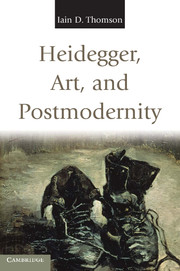Book contents
- Frontmatter
- Contents
- List of Illustrations
- Acknowledgments
- Abbreviations Used for Works by Heidegger
- A Note on the Notes (Redux)
- Introduction
- 1 Understanding Ontotheology, or “The History that We Are”
- 2 Heidegger's Critique of Modern Aesthetics
- 3 Heidegger's Postmodern Understanding of Art
- 4 “Even Better than the Real Thing”?
- 5 Deconstructing the Hero
- 6 The Philosophical Fugue
- 7 The Danger and the Promise of Heidegger, an American Perspective
- 8 Against Conclusions
- References
- Index
1 - Understanding Ontotheology, or “The History that We Are”
Published online by Cambridge University Press: 05 June 2012
- Frontmatter
- Contents
- List of Illustrations
- Acknowledgments
- Abbreviations Used for Works by Heidegger
- A Note on the Notes (Redux)
- Introduction
- 1 Understanding Ontotheology, or “The History that We Are”
- 2 Heidegger's Critique of Modern Aesthetics
- 3 Heidegger's Postmodern Understanding of Art
- 4 “Even Better than the Real Thing”?
- 5 Deconstructing the Hero
- 6 The Philosophical Fugue
- 7 The Danger and the Promise of Heidegger, an American Perspective
- 8 Against Conclusions
- References
- Index
Summary
The significant problems we face cannot be solved by the same level of thinking that created them.
Albert Einstein (popular bumper sticker)It is one of life's ironies in our times that so many of us require more knowledge, even to find our way home, than we really care to have.
J. Glenn Gray, The Promise of WisdomWhat does Heidegger mean by ontotheology, and why should we care? We will see that Heidegger understands ontotheology as the two-chambered heart of Western metaphysics, “the history that we are” (N3 20/GA47 28). As I showed in Heidegger on Ontotheology: Technology and the Politics of Education, Heidegger's deconstruction of the metaphysical tradition leads him to the view that metaphysics does not just concern philosophers isolated in their ivory towers; on the contrary, “Metaphysics grounds an age.” As he explains: “Metaphysics grounds an age in that, through a specific interpretation of what is …, it gives the age the ground of its essential form” (QCT 115/GA5 75). Here Heidegger advances the thesis I call ontological holism. Put simply: Everything is, so by changing our understanding of what “is-ness” itself is, metaphysics can change our understanding of everything. In other words, metaphysics molds our very sense of what it means for something – anything – to be. Because everything intelligible “is” in some sense, Heidegger holds that: “Western humanity, in all its comportment toward entities, and that means also toward itself, is in every respect sustained and guided by metaphysics” (N4 205/GA6.2 309).
- Type
- Chapter
- Information
- Heidegger, Art, and Postmodernity , pp. 7 - 39Publisher: Cambridge University PressPrint publication year: 2011



